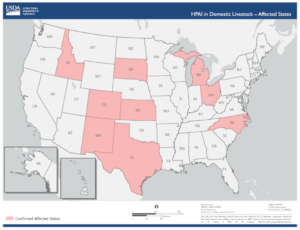As the holidays approach, bird flu is once again sweeping through commercial and backyard poultry flocks, infecting and killing more than 8.9 million turkeys, chickens, and ducks in the U.S…
US Beef, Dairy Products Remain Safe From Bird Flu
*Yesterday’s Farm Policy News Summary incorrectly stated that House Agriculture Committee Democrats had proposed their own Farm Bill. The story has been corrected to say that House Ag Committee Democrats offered a counter proposal to Chairman GT Thompson’s Farm Bill funding proposal. We regret the error.
————————————————————————————————————————————————————————————————————————————————————
Reuters reported that “the U.S. Department of Agriculture (USDA) said on Wednesday that all the ground beef samples sent to the National Veterinary Services Laboratories (NVSL) for PCR testing were negative for the H5N1 bird flu virus.”
“USDA’s Food Safety and Inspection Service (FSIS) collected 30 samples of ground beef from retail outlets in the states with dairy cattle herds that had tested positive for H5N1 at the time of sample collection,” Reuters reported. “‘NVSL reported that all samples tested negative for H5N1. These results reaffirm that the meat supply is safe,’ the USDA added.”
In addition, Reuters’ Julie Steenhuysen and Tom Polansek reported that “preliminary results of tests on additional dairy products show that pasteurization inactivates the bird flu virus, the U.S. Food and Drug Administration said on Wednesday.”
“The FDA released further test results on foods including sour cream and cottage cheese, after reporting last week that preliminary results from testing showed pasteurization kills the H5N1 virus in milk and baby formula,” Steenhuysen and Polansek reported. “…The FDA so far has tested 297 total retail samples of pasteurized dairy products, and the results released on Wednesday represent tests on 201 of those samples.”
Current State of the Outbreak in Dairy Cattle
Progressive Farmer’s Chris Clayton reported on Monday that “USDA’s Animal and Health Plant Inspection Service added Colorado to its list of states with dairy herd infections — the first herd with a reported infection in the past week. USDA now shows nine states with a total of 34 infected herds nationally.”

“Since 2022, bird flu in the United States has infected over 90 million chickens, more than 9,000 wild birds, 34 dairy herds, one person in Texas who came in close contact with infected cattle and another after exposure to poultry,” Reuters reported.
While the virus continues to spread among dairy cattle in the U.S., there have been no human cases identified since the dairy worker in Texas tested positive at the beginning of April, according to Steenhuysen and Polansek, who reported that “CDC official Dr. Demetre Daskalakis said the agency has monitored about 100 people who have been exposed to bird flu, and around 25 people who developed symptoms have been tested. So far, no additional positive cases have been found.”
The CDC “tested a sample of the virus taken from the farm worker who was infected with H5N1 and found that all commercially available antiviral flu treatments are effective against it,” Steenhuysen and Polansek wrote. “Currently approved antiviral drugs include Roche’s Xofluza and Tamiflu as well as a generic version of Tamiflu, Relenza and BioCryst Pharmaceuticals’ Rapivab.”
“Both the U.S. Centers for Disease Control and Prevention and the World Health Organization have said the overall public health risk is low, but is higher for those with exposure to infected animals,” Reuters reported. “Scientists remain vigilant for any alterations in the H5N1 virus that could adapt it to spread easily among humans. The virus has been responsible for severe infections in people who have been in close proximity to wild birds or poultry.”
Trade Implications
Clayton reported Monday that, so far, U.S. “trading partners have largely been restrained over the H5N1 cases in cattle.”
“Canadian officials have asked USDA to conduct the same tests for dairy cattle entering Canada from the U.S.,” Clayton reported. “Turkey and the Dominican Republic have banned imports of live cattle, and Colombia has banned imports of live cattle and also restricted imports of beef from slaughter establishments in states that have H5N1-infected cattle.”





